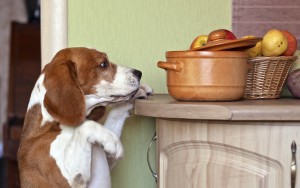Common Thanksgiving Pet Hazards (And, What You Can do to Avoid Them)
 Thanksgiving is a time for sharing, celebrating, and remembering our loved ones. It’s easy to be thankful for those who make our lives so rich and meaningful, including the sweet pets who entrust us to their care and well-being.
Thanksgiving is a time for sharing, celebrating, and remembering our loved ones. It’s easy to be thankful for those who make our lives so rich and meaningful, including the sweet pets who entrust us to their care and well-being.
While we’re busy preparing the feast, passing the turkey, and relaxing with the fam, our pets may be perusing some scraps or that inviting, brightly colored new plant. Taking the hazardous out of holidays, however, can be as simple as taking a few steps and asking others to help us in keeping Mittens or Monty safe and secure. From risks such as overindulgence in fatty foods to accidental poisonings or intestinal blockages, no pet guardian wants to spend this day of thanks at the veterinary emergency clinic.
To help keep you and your family pet safety-savvy, consider discussing how to avoid these Thanksgiving pet hazards…
Fatty Food Fiasco
Just when you think YOU have finally learned about the effects of a high-fat diet on your physical health (and just in time for Thanksgiving –sigh-), so, too, is a diet of overindulgence bad for your pet. In fact, feeding your pet fatty scraps (turkey skin, gravy, etc.) from the table can lead to a number of problems, from accidental poisoning to pancreatitis, which is the inflammation of the pancreas, causing symptoms such as vomiting, diarrhea, and lethargy.
If you want to offer your pet something healthy and delicious, opt for a SMALL portion of one of the following items:
- Unseasoned, cooked, deboned turkey or other lean meat
- Steamed, unsalted carrots or green beans
- A dollop of unsweetened pumpkin pulp
Common Thanksgiving foods that present bigger problems due to their toxicity include garlic and onions, chocolate, nutmeg, nuts (especially macadamia), and Xylitol (the sugar substitute used in baked goods). These ingredients can cause life-threatening emergencies, so when speaking to family members, remind them of the importance of abstaining from handing out scraps or leftovers.
Trash Talk
If your pet is particularly fond of scrounging around in the garbage can or rooting in the backyard for compost, it is especially important to take heed when cooking or cleaning up after the big feast. Trash and compost can present issues because we aren’t entirely sure what our canine or feline friends decided to snarf down before we could stop them.
When handling trash, also be sure to avoid leaving out non-edible items that can cause an intestinal blockage, such as:
- Cooking string
- Aluminum foil
- Plastic wrap
- Cake decorations
- Bones
- Holiday string and ribbons
Can’t We All Just Get Along?
As much as we love our pets, sometimes it is neither safe nor practical to include them in our celebrations – particularly when our canine friend is still working on socialization issues or our cousin is highly allergic to Fluffy.
In some cases, it may be better for humans and animals alike to either consider boarding or – in a less problematic case, keeping our pet preoccupied with favorite treats or toys in a quiet, secure room in the house.
In the case of significant travel time, unless your pet travels like a pro, it’s generally a good idea to find a great boarding facility or pet-sitter to watch your dear one while the family is away. For questions about boarding or ways you can better prepare your pet for the holidays, give us a call.
From all of us at Volunteer Veterinary Hospital, we hope you and yours have a wonderful, festive, and pet-safe Thanksgiving holiday!

